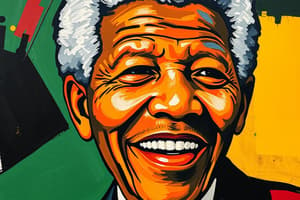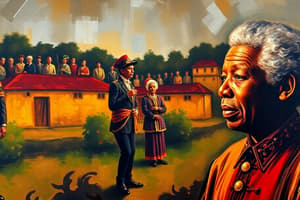Podcast
Questions and Answers
What year was Nelson Mandela arrested?
What year was Nelson Mandela arrested?
1962
How many years did Nelson Mandela spend in prison?
How many years did Nelson Mandela spend in prison?
27 years
What was the system of institutionalized racial segregation in South Africa called?
What was the system of institutionalized racial segregation in South Africa called?
Apartheid
Who did Nelson Mandela form bonds with while in prison?
Who did Nelson Mandela form bonds with while in prison?
In which decade did Mandela's involvement in the anti-apartheid movement begin?
In which decade did Mandela's involvement in the anti-apartheid movement begin?
What radical forms of resistance was Nelson Mandela drawn into as the struggle against apartheid intensified?
What radical forms of resistance was Nelson Mandela drawn into as the struggle against apartheid intensified?
In what year was Nelson Mandela elected as South Africa's first Black president in the country's first fully democratic election?
In what year was Nelson Mandela elected as South Africa's first Black president in the country's first fully democratic election?
Who did Nelson Mandela share the Nobel Peace Prize with in 1993 for their joint efforts to end apartheid and promote peace?
Who did Nelson Mandela share the Nobel Peace Prize with in 1993 for their joint efforts to end apartheid and promote peace?
What did Nelson Mandela's presidency mark in South Africa's history?
What did Nelson Mandela's presidency mark in South Africa's history?
What did Nelson Mandela's commitment to nonviolent resistance demonstrate?
What did Nelson Mandela's commitment to nonviolent resistance demonstrate?
Flashcards are hidden until you start studying
Study Notes
Nelson Mandela: An Inspiring Journey
Nelson Mandela, born in 1918, is a legendary figure whose life spanned pivotal moments in South Africa's history, including the fight against apartheid, his imprisonment, and his eventual presidency. This narrative traces the remarkable journey of Mandela, revealing how he became an emblem of resilience, peace, and freedom.
Imprisonment
Nelson Mandela was arrested in 1962 and sentenced to life imprisonment in 1964 for conspiring to overthrow the apartheid government. He spent 27 years in South Africa's notorious prisons, including Robben Island, Pollsmoor, and Victor Verster. His incarceration became a symbol of the country's oppressive regime, but also a beacon of hope for the anti-apartheid movement.
During his time in prison, Mandela continued to advocate for human rights and racial equality. He formed bonds with fellow prisoners, including future President F.W. de Klerk, and forged a united front against the apartheid regime.
Apartheid
Apartheid, a system of institutionalized racial segregation, dominated South Africa from 1948 to 1994. It divided the population along racial lines, leading to the disenfranchisement and oppression of non-white South Africans. Mandela fought against this system throughout his life, drawing inspiration from his own experiences and the struggles of his people.
Mandela's involvement in the anti-apartheid movement began in the 1940s. He joined the ANC (African National Congress) and became a leader in the organization's Youth League. As the struggle intensified, he was drawn into more radical forms of resistance, including sabotage and guerrilla warfare.
Anti-apartheid Movement
The anti-apartheid movement, which Mandela helped to shape, was a broad coalition of opposition forces that aimed to challenge South Africa's racist regime. The movement included a diverse range of organizations, from trade unions and student groups to religious bodies and political parties.
Mandela's role in the movement is difficult to overstate. He served as the leader of the ANC, and his personal sacrifice and unwavering commitment to justice inspired a generation of activists. His willingness to engage in dialogue with the apartheid regime, even when faced with years of imprisonment, demonstrated the power of nonviolent resistance and the possibility of peaceful change.
Presidency
In 1994, Nelson Mandela was elected as South Africa's first Black president in the country's first fully democratic election. His presidency marked a turning point in South Africa's history, as he worked to dismantle the apartheid system and build a nation based on equality, justice, and unity.
Mandela's tenure as president was marked by a series of historic achievements. He negotiated a peaceful transition from apartheid to democracy, drafted the country's new constitution, and worked to heal the deep wounds caused by the apartheid era. He also played a key role in promoting reconciliation and forgiveness, encapsulated in his famous statement, "Forget the past."
In 1993, he shared the Nobel Peace Prize with F.W. de Klerk, a former apartheid leader, in recognition of their joint efforts to end apartheid and promote peace. Mandela's commitment to nonviolent resistance and his willingness to engage in dialogue with his former oppressors continue to inspire people around the world.
In conclusion, Nelson Mandela embodies the power of hope and the resilience of the human spirit. His journey from imprisonment to presidency is a testament to the transformative potential of nonviolent resistance and the possibility of peaceful change. Mandela's legacy serves as a powerful reminder of the importance of standing for justice and equality, even in the face of great adversity.
Studying That Suits You
Use AI to generate personalized quizzes and flashcards to suit your learning preferences.




